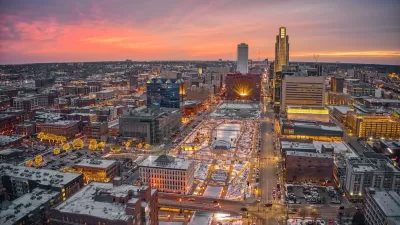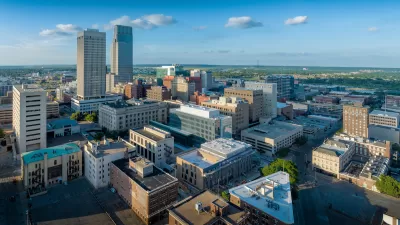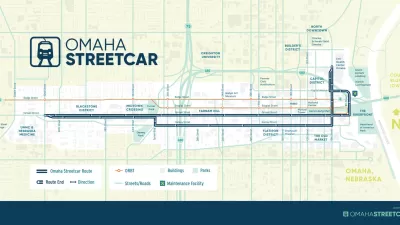A third party analysis predicts that the revenue brought in by development along the proposed streetcar line would bring in sufficient revenue to cover initial costs.

The Omaha streetcar project is one step closer to reality after an independent consulting firm, MuniCap, concluded that the financial plan presented by the city is viable and would stimulate more than enough revenue to cover the cost of the project. As Jessica Wade reports for the Omaha World-Herald, the revenue projections in the analysis surpass prior estimates.
“MuniCap’s analysis leans heavily on assumptions, including estimates of future property values, the rate of tax credits, the strength of Omaha’s economy and little change in zoning laws,” Wade explains. “If those assumptions hold, the firm predicts that a special district along the streetcar route will see more than $600 million in tax-increment financing revenues through 2057.”
The plan relies on $80 million in lease purchasing bonds and $360 million in redevelopment bonds to cover capital costs, which would be repaid by tax-increment financing (TIF). After the streetcar is built, “New developments on three blocks on either side of the streetcar would contribute 25% of their TIF proceeds. That element alone is projected to generate more than $421 million.”
FULL STORY: Analysis of Omaha streetcar financial plan predicts development will cover project cost

Planetizen Federal Action Tracker
A weekly monitor of how Trump’s orders and actions are impacting planners and planning in America.

Chicago’s Ghost Rails
Just beneath the surface of the modern city lie the remnants of its expansive early 20th-century streetcar system.

San Antonio and Austin are Fusing Into one Massive Megaregion
The region spanning the two central Texas cities is growing fast, posing challenges for local infrastructure and water supplies.

Since Zion's Shuttles Went Electric “The Smog is Gone”
Visitors to Zion National Park can enjoy the canyon via the nation’s first fully electric park shuttle system.

Trump Distributing DOT Safety Funds at 1/10 Rate of Biden
Funds for Safe Streets and other transportation safety and equity programs are being held up by administrative reviews and conflicts with the Trump administration’s priorities.

German Cities Subsidize Taxis for Women Amid Wave of Violence
Free or low-cost taxi rides can help women navigate cities more safely, but critics say the programs don't address the root causes of violence against women.
Urban Design for Planners 1: Software Tools
This six-course series explores essential urban design concepts using open source software and equips planners with the tools they need to participate fully in the urban design process.
Planning for Universal Design
Learn the tools for implementing Universal Design in planning regulations.
planning NEXT
Appalachian Highlands Housing Partners
Mpact (founded as Rail~Volution)
City of Camden Redevelopment Agency
City of Astoria
City of Portland
City of Laramie





























